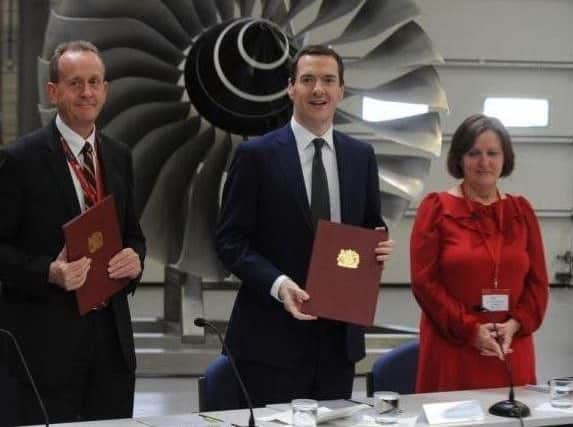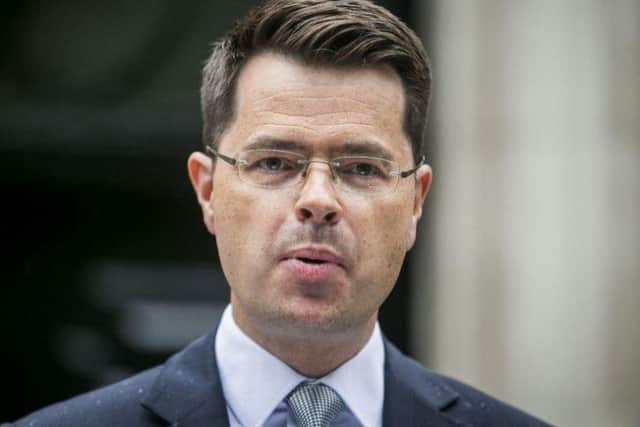Why One Yorkshire supporters won't give up on the devolution "holy grail"


Fast-forward 18 months and it’s clear that, despite the support of businesses, trade unions and even the Archbishop of York, the future of the proposed One Yorkshire devolution deal is at best uncertain.
A letter on Tuesday from Communities Secretary James Brokenshire to Yorkshire’s local authority leaders, followed shortly by a statement to the media, said government officials had decided the plan did not fit the criteria for a successful devolution bid.
Advertisement
Hide AdAdvertisement
Hide AdAnd as the dust settled on the decision yesterday the council leaders who submitted the plans to government, known collectively as the ‘coalition of the willing’, weighed up their next move.
The stakes could not be higher, with Manchester, Liverpool and the Tees Valley all using devolved powers handed down from government to tackle issues of regeneration, health and economic growth as Yorkshire looks on from the sidelines.
Politicians hoping a deal of some kind can be achieved will be considering the wording of Mr Brokenshire’s letter, which says the Government is prepared “to begin discussions about a different, localist approach to devolution in Yorkshire”.
Advertisement
Hide AdAdvertisement
Hide AdHighlighting the “local appetite” for devolution elsewhere in the region, he points to “representations made previously by the Leeds City Region, York and North Yorkshire and the Humber Estuary”.


Whether any of those ideas, some of which have already been floated and rejected by government or local MPs, gain traction remains to be seen.
But one backer of a region-wide deal told The Yorkshire Post that local politicians remain “resolute” in standing by a deal that until yesterday had the support of all but two council leaders.
This is in part because while One Yorkshire was only arrived at because no other solution could be agreed on, it remains the only devolution plan with any kind of widespread backing – including the community poll of Doncaster and Barnsley carried out in 2017.
Advertisement
Hide AdAdvertisement
Hide Ad

In an interview on BBC Leeds radio, Northern Powerhouse Minister Jake Berry blamed councils for the fact a Leeds City Region deal was not agreed, ignoring the opposition from Tory MPs which effectively blocked it.
And there is incredulity that, with the expected devolution framework document setting out the criteria for successful devolution bids yet to be published as Brexit dominates the Whitehall landscape, a Minister can rule out a well-evidenced plan.
The problem stems from the perception that devolution deals can only be handed out to authorities presiding over “functional economic areas” – something Mr Brokenshire says Yorkshire and its mixture of rural and urban communities does not represent.
Advertisement
Hide AdAdvertisement
Hide AdBut One Yorkshire backers point to the North of Tyne devolution deal agreed last year, with £600m handed out to a mayoral authority covering an area which splits the North-East down the middle.
Unwilling to jettison a plan which has seen so much effort and expense go into it, local leaders who back One Yorkshire now hope to get a meeting with Mr Brokenshire at the earliest possible opportunity to try and work out the way forward.
Some see One Yorkshire – and its potential £30bn-a-year boost to the economy – as the ‘holy grail’ but one that could be arrived at via a series of smaller city region deals. And one senior Yorkshire official put it, more involvement is needed from the Government during this process: “There is a full menu of options, if they don’t like what’s on the menu, what would they like?”
So, what are the other devolution options?
Leeds City Region
One of the earliest devolution proposals to emerge as part of George Osborne’s Northern Powerhouse Strategy, a Leeds City Region deal would take in West Yorkshire and some surrounding districts.
Advertisement
Hide AdAdvertisement
Hide AdBut despite initial apparent enthusiasm from government, plans to introduce a mayor for the city region with funding and powers over infrastructure, jobs and housing have yet to come to fruition.
In 2015, a deal was agreed between the West Yorkshire Combined Authority and the government to give council leaders and businesses greater influence over investment decisions in certain areas.
But the agreement was described as “disappointing” by local leaders, who called for more dramatic devolution to help improve the local economy.
Amid lobbying from Conservative MPs who oppose the deal (but deny the likelihood of a Labour mayor is the main motivation), the Leeds City Region proposals never gained an official response from the Government and were considered all but dead until this week.
Advertisement
Hide AdAdvertisement
Hide AdDespite this, the idea still has its supporters. Wakefield council leader Peter Box still maintains it is the best way of promoting economic growth in his city, despite reluctantly backing One Yorkshire.
But a city region mayor would likely prompt further claims of ‘balkanisation’ in the region and potentially split North Yorkshire, with some districts joining and others not.
North Yorkshire County Council has previously resisted any suggestion that Harrogate, Craven and Selby, part of the Leeds City Region local enterprise partnership zone, should split off to form a transport authority with West Yorkshire.
York City Region
If a plan for city region mayors along the lines of Greater Manchester and Liverpool is to gain traction in Yorkshire, it could include a York City Region taking in some, if not all, of rural North Yorkshire and the city itself.
Advertisement
Hide AdAdvertisement
Hide AdIn a column last year, Thirsk and Malton MP Kevin Hollinrake, inset, was joined by Sheffield MP Clive Betts in advocating the arrangement, which they said would “more closely understand and appreciate the needs of those rural and urban communities” than a region-wide deal.
A local enterprise partnership promoting economic growth already exists for North Yorkshire and the East Riding, but as with other city deals, the sticking point might be which districts are included and which are left out.
City of York, Craven, Selby and Harrogate are already part of the Leeds City Region and their leaders may prefer to face towards the bigger economy of West Yorkshire rather than align themselves with coastal and rural North Yorkshire.
Reflecting on this week’s letter from James Brokenshire, Mr Hollinrake said: “This may appear to be a blow to Yorkshire’s devolution dreams but there is a better option and I hope everyone will come together to support it.
Advertisement
Hide AdAdvertisement
Hide Ad“City regions are proven to be the most effective way to drive productivity. Tees Valley Mayor, Ben Houchen, is a great example of how an effective leader who is passionate about his area can revitalise a smaller but economically-connected area.”
Greater Yorkshire
Some Tories insist that with the Sheffield City Region deal in place the rest of the region should press on with an arrangement taking in everything other than South Yorkshire.
A ‘Greater Yorkshire’ deal fitting this description would, according to its backers, “build on the coherence and formidable ‘clout’ of the entire West, North and East Yorkshire economy”.
Speaking to The Yorkshire Post last year, Elmet & Rothwell MP Alec Shelbrooke said that including the more deprived South Yorkshire in any deal would lead to it being subsidised by other parts of the region.
Advertisement
Hide AdAdvertisement
Hide AdHe added: “This is not in the best interests of my constituents in West Yorkshire, nor in the interests of councils across North, West and East Yorkshire.
“South Yorkshire already has a multi-million pound devolution deal in place and an elected mayor charged with delivering for his region.
“It’s now time for the rest of Yorkshire to pull together and take charge of our own future with a Greater Yorkshire deal.”
Craig Whittaker, Calder Valley MP and a Tory whip, also backs the idea but says it is unlikely to become a reality because of the possibility of a more limited York City Region deal.
Advertisement
Hide AdAdvertisement
Hide AdFrom a party-political point of a view, a devolution deal leaving out Labour-dominated Barnsley, Doncaster, Sheffield and Rotherham would be more likely to find favour with Conservatives worried about the clout of a One Yorkshire Labour with a mandate of the whole region behind them.
But given the Government’s rejection of One Yorkshire on the grounds that the region is not a “functional economic area”, it is hard to see how a deal taking in most but not all of the region could be approved on the same criteria.
Sheffield City Region
When Barnsley MP and former paratrooper Dan Jarvis was elected with 144,154 votes as Sheffield City Region mayor, he pledged to bring together the area’s feuding local leaders to implement its £30m-a-year devolution deal.
Nine months later the dispute between the leaders of Barnsley, Doncaster, Rotherham and Sheffield councils is proving a hard nut to crack, meaning Mr Jarvis still has few of the powers enjoyed by his counterparts in Manchester and Liverpool.
Advertisement
Hide AdAdvertisement
Hide AdThe Sheffield City Region deal was agreed in 2015 and signed by then-Chancellor George Osborne, with the promise of £900m being handed over from Whitehall over three decades and powers over transport, strategic planning and skills.
But as One Yorkshire gathered momentum, Doncaster and Barnsley decided their future lay with a bigger devolution deal and withdrew from the arrangement.
Though Sheffield and Rotherham remain committed to the Sheffield City Region deal, the failure to complete all the necessary processes mean it has not come into force and the spending taps are yet to be turned on.
Leaders in Doncaster and Barnsley, whose residents backed a region-wide deal in a poll in 2017, say they are willing to implement the local arrangement if it can be a stepping stone to One Yorkshire.
But to make progress, talks need to restart between local leaders and with government.